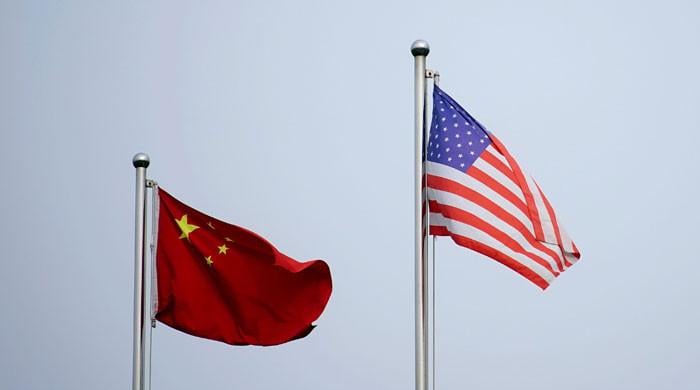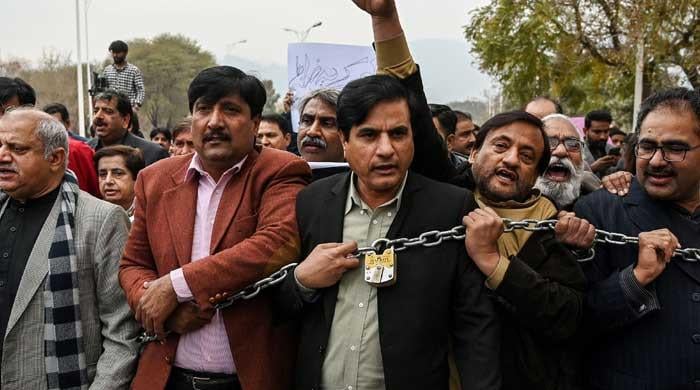Democracy and the left
Most of Marxist groups have been involved in intellectual polemics over variety of national, international issues
April 10, 2025

The history of the left in Pakistan has been riddled with divisions, factionalism and ideological sectarianism. And it is not only in Pakistan where such divisions emerge from time to time; the left all over the world stands disunited. Every country on earth has a myriad of Marxist factions claiming to be global and universal in nature but their activists largely remain unknown.
Most of these groups have been involved in intellectual polemics over a variety of national and international issues instead of focusing on the daily issues affecting the people. Their indifference has led to the rise of the far-right in advanced capitalist countries and the ascendancy of religious extremist forces in several parts of the Global South.
Critics believe that one of the factors contributing to this factionalism and ideological sectarianism is the aversion of Marxists in general to democracy. Since many Marxist parties are not in mainstream politics, they don’t have any mass support. If they had such mass support, it might have gone some way in thwarting these divisions because the support of any socialist party on a massive scale would have deterred its leaders from splitting the organisation for the sake of petty interests. In case of a popular support base, they would have to be accountable to millions of people and might have to go through several processes before harming the unity of a party built over the years or possibly decades.
It is important to understand Marx and Engels’ attitude towards democracy. It is unfortunate that a number of communist parties across the world outright reject the very notion of democracy. One finds very little mention of democracy in Marxist authors’ writings; instead such writings are full of revolutionary rhetoric, denouncing democracy. This gives an impression that Marx and Engels were rabidly anti-democracy and averse to the very idea of elections and adult enfranchisement.
Leftist writers and communist leaders may have heaped scorn on democracy and democratic ideas but Marx and Engels’ writings speak otherwise. Marx and Engels wrote at a great length on the subject in 'The Class Struggle in France' but they used other avenues to express their opinions on it as well.
For instance, in March 1850 addressing the Communist League, Marx advised the workers of Germany to contest polls. He said, “The workers' party should put up candidates for elections in Germany in the event of the creation of a national assembly as a result of revolutionary upheaval: Even when there is no prospect whatsoever of their being elected, the workers must put up their own candidates in order to preserve their independence, to count their forces, and to bring before the public their revolutionary attitude and party standpoint.”
German workers paid heed to Marx’s advice and in the elections of 1871, the Social Democratic Party secured over 100,000 votes, 352000 in 1874 and 493000 in 1877. Marx was euphoric over the results. In ‘The Class Struggle in France’, he wrote, “The results of the polls had frightened the German state forcing it to impose anti-socialist law. He said by showing their strength in the polls, the German workers had taught their fellow comrades the use of a new weapon, which is the sharpest weapon of vote.
One needs to go through Engels’ introduction to 'The Class Struggle in France', where he said, “The winning of universal suffrage, of democracy, as one of the first and the most important tasks of the militant proletariat, and Lassalle had again taken up this point. Now, when Bismarck found himself compelled to introduce this franchise, the only means of interesting the mass of the people in his plans, our workers immediately took it in earnest and sent August Bebel to the first, constituent Reichstag. And from that day on, they have used the franchise in a way which has paid them a thousand-fold and has served as a model to the workers of all countries. The franchise has been in the words of French Marxist programme — transformed by them from a means of deception, which it was before, into an instrument of emancipation.”
He further goes on to say: “With this successful utilisation of the universal suffrage, however, an entirely new method of proletarian struggle came into operation, and this method quickly developed further. It was found that the state institutions, in which the rule of the bourgeoisie organised, offer the working class still further opportunities to fight these very state institutions.
"The workers took part in elections to particular Diet, German legislature, to municipal councils, and to trade courts; they contested with the bourgeoisie every post in the occupation of which a sufficient part of the proletariat had a say. And so, it happened that the bourgeoisie and the government came to be much more afraid of the legal than the illegal action of the workers' party, of the results of the elections than of those of rebellion.”
It may be interesting for those who insist on bringing about a revolution by an organised tiny minority to read what Engels said in the introduction about such things. “The time of surprise attacks, of revolutions carried through by small conscious minorities at the head of unconscious masses, is past. In order that masses may understand what is to be done, long, persistent work is required.”
The German elections and the participation of workers in such polls encouraged other socialist parties to revisit their strategies. Engels wrote, “In the Latin countries, also, it is being realised more and more that old tactics must be revised. Everywhere, the German example of utilising the suffrage, of winning all posts accessible to us, has been imitated; everywhere, the unprepared launching of an attack has been relegated to the background.
"In France where more than a hundred years the ground has been undermined by revolution after revolution, where there is not a single party which has not done its share in conspiracies, insurrections and all other revolutionary actions; in France where as a result, the government is by no means sure of the army and where in general, the conditions for an insurrectionary coup de main are far more favourable than in Germany — even in France the socialists are realising more and more that no lasting victory is possible for them unless they first win the great mass of the people, that is, in this case, the peasants.
"Slow propaganda work and parliamentary activities are recognised here, too, as the immediate task of the party. Successes were not lacking. Not only have a whole series of municipal councils been won; fifty socialists have seats in the Chambers and they have already thrown three ministries and a president of the republic. In Belgium last year the workers forced the adoption of franchise, and have been victorious in a quarter of the constituencies. In Switzerland, in Italy, in Denmark, yes even in Bulgaria and Romania the socialists are represented in the parliaments.”
Disclaimer: The viewpoints expressed in this piece are the writer's own and don't necessarily reflect Geo.tv's editorial policy.
The writer is a freelance journalist who can be reached at: [email protected]
Originally published in The News











